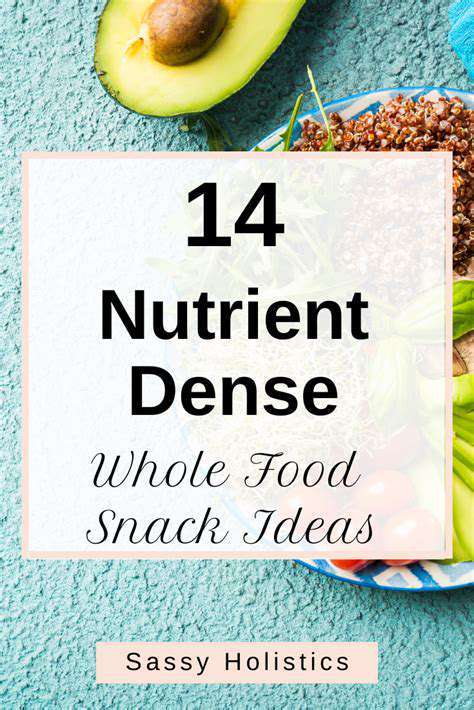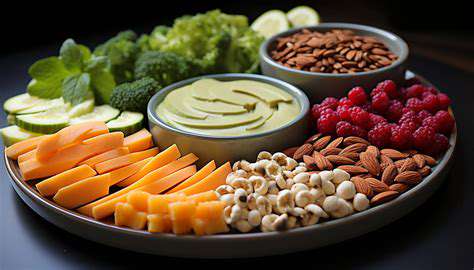Understanding Healthy Snacking for Kids: Smart Choices

Beyond the Chips: Unveiling the Power of Nutrient-Rich Snacks
Snacking is a crucial part of a balanced diet, offering opportunities to boost energy levels, curb hunger pangs, and provide essential nutrients. However, many commercially available snacks are often loaded with empty calories, unhealthy fats, and excessive sugar, leading to potential health problems.
The pursuit of a healthier lifestyle often necessitates a shift in snacking habits, focusing on nutrient-rich options that support overall well-being. These choices provide vital vitamins, minerals, and antioxidants, contributing to a stronger immune system, improved digestion, and sustained energy throughout the day.
Exploring Nutrient-Dense Alternatives
Fortunately, there are numerous delicious and nutritious snack alternatives available, beyond the typical processed chips and sugary treats. These options offer a wide range of flavors and textures, ensuring that snacking can be both satisfying and healthy.
Fruits, vegetables, and whole grains are excellent choices, brimming with essential vitamins, minerals, and fiber. They provide sustained energy and promote healthy digestion, keeping you feeling full and satisfied.
The Importance of Fiber in Snacking
Fiber plays a crucial role in maintaining digestive health and promoting satiety. Including fiber-rich snacks in your diet can help regulate bowel movements, prevent constipation, and provide a feeling of fullness.
Fiber-rich snacks like nuts, seeds, and whole-grain crackers are excellent choices. They contribute to a healthy gut microbiome and support overall metabolic function.
Protein Powerhouses for Snacking
Protein-rich snacks are essential for building and repairing tissues, maintaining healthy blood sugar levels, and promoting feelings of fullness and satiety. Lean protein sources are crucial for muscle growth and recovery.
Including protein-rich snacks like Greek yogurt, hard-boiled eggs, or edamame can effectively curb hunger and provide sustained energy throughout the day. These choices can be particularly beneficial after workouts or during periods of intense activity.
Hydration and Healthy Snacking
Often overlooked, hydration plays a vital role in overall well-being and can significantly impact snacking habits. Staying properly hydrated can curb cravings and help manage hunger effectively.
Mindful Snacking Practices
Mindful snacking practices are crucial for creating a positive relationship with food. Paying attention to hunger cues and choosing snacks that nourish the body and mind can lead to a healthier lifestyle.
Developing mindful eating habits can help you avoid overeating and appreciate the flavors and textures of your snacks. This approach can enhance your overall enjoyment of food and contribute to a more balanced diet.
Beyond the Plate: Snacking and Overall Health
The types of snacks we consume significantly impact our overall health. Choosing nutrient-rich options can contribute to improved energy levels, better digestion, and a stronger immune system.
Nutrient-rich snacks can be an integral part of a well-rounded diet. By making smart choices, individuals can cultivate healthier eating habits and enjoy a more fulfilling and balanced lifestyle.
Portion Control: A Crucial Element of Healthy Snacking

Understanding Portion Control
Portion control is a fundamental aspect of healthy eating, playing a crucial role in weight management and overall well-being. It involves understanding the appropriate amount of food to consume at each meal and snack. This awareness helps prevent overeating, which can lead to unnecessary calorie intake and potential weight gain. Portion control is not just about restricting food; it's about making informed choices and establishing mindful eating habits.
Proper portion sizes vary depending on individual needs, activity levels, and health goals. Consulting a registered dietitian or nutritionist can provide personalized guidance on determining appropriate portions for your specific circumstances. This personalized approach ensures that you receive the necessary nutrients without exceeding your calorie requirements, ultimately supporting your health journey.
The Impact of Portion Sizes on Health
Uncontrolled portion sizes can contribute significantly to various health issues, including obesity and related complications like type 2 diabetes and heart disease. Consuming larger portions than recommended can lead to a surplus of calories, stored as fat, and ultimately contribute to weight gain. This excess weight can put a strain on the cardiovascular system and increase the risk of developing chronic diseases.
Conversely, consuming appropriate portions can promote better metabolic function. It can also significantly impact blood sugar levels and reduce the risk of developing obesity-related ailments. Maintaining a healthy weight range through mindful portion control can positively influence overall health and well-being.
Practical Strategies for Portion Control
Employing practical strategies can greatly assist in achieving and maintaining portion control. Using smaller plates and bowls can visually reduce the perception of portion size, making you feel satisfied with a smaller amount. Furthermore, taking your time during meals, savoring each bite, and paying attention to your body's fullness cues can significantly impact your overall eating habits.
Mindful eating techniques, such as putting your fork down between bites and focusing on the taste and texture of your food, can help you eat more slowly and be more aware of your body's signals of fullness. These strategies can lead to a more enjoyable and satisfying meal experience while promoting healthier eating habits.
Tools and Resources for Portion Control
Numerous resources are available to assist individuals in practicing portion control. Many online tools and apps provide visual aids and guidelines for portion sizes of various foods. These tools can be very helpful in tracking calorie intake and understanding recommended servings.
Utilizing measuring cups and spoons can also be effective in accurately estimating portion sizes. This precision can be particularly helpful when preparing meals at home. Furthermore, understanding portion sizes for common restaurant dishes and choosing smaller portions when dining out can significantly contribute to maintaining healthy eating habits.
Maintaining Portion Control in Everyday Life
Incorporating portion control into your daily routine requires consistent effort and awareness. Planning meals and snacks in advance can help you make conscious choices about portion sizes. Preparing your own meals allows you to control ingredients and portions, eliminating the uncertainty associated with restaurant or takeout food. This proactive approach can empower you to manage your food intake effectively.
Keeping healthy snacks readily available can help prevent impulsive overeating. These snacks should be portioned appropriately to meet your nutritional needs without exceeding recommended calorie limits. This strategy can be very helpful in managing hunger between meals and preventing unnecessary cravings.
Making Healthy Snacking a Family Affair

Encouraging Healthy Choices
Making healthy snacking a family affair is about more than just limiting sugary treats; it's about instilling positive habits for a lifetime. Creating a supportive environment where everyone feels empowered to choose nutritious options is key. This involves open communication and acknowledging that everyone's tastes and needs differ. You might find your children are more receptive to healthy options if they are involved in the decision-making process.
Healthy snacking isn't about deprivation; it's about balance and variety. Providing a range of healthy options caters to diverse preferences, and teaching children to recognize hunger cues rather than relying on mindless snacking is an important life skill.
Planning and Preparation
A crucial aspect of making healthy snacking a family affair is proactive planning. This involves strategically stocking the pantry and fridge with nutritious options. Having healthy snacks readily available and easily accessible is essential to encouraging mindful consumption. Think fruits, vegetables, yogurt, nuts, and whole-grain crackers.
Planning ahead also means considering the timing of snacks. Scheduling regular snack times throughout the day can prevent overeating at mealtimes and help manage hunger pangs in between meals.
Involving the Whole Family
Get everyone involved in the process! Children can help with preparing snacks, such as washing fruits and vegetables or setting the snack table. This fosters a sense of ownership and encourages a positive association with healthy food choices. Involving kids in the process can make them more interested in trying new things.
When grocery shopping, involve children in choosing fruits and vegetables. Let them pick out their favorite healthy snacks. This is a great way to teach them about nutrition and food choices.
Understanding and Addressing Individual Needs
Recognizing that each family member has unique dietary needs is crucial. Some might have allergies, sensitivities, or specific nutritional requirements. Adjusting snack options to accommodate these differences will ensure that everyone feels included and supported. It also helps in developing a more inclusive environment around food.
For instance, if someone has a nut allergy, you need to ensure you have suitable alternatives available. This demonstrates that healthy eating is not one-size-fits-all.
Creating a Positive Snacking Environment
The environment plays a significant role in shaping snacking habits. Create a designated snack area. A calm and relaxed atmosphere encourages mindful eating and prevents impulsive decisions. This helps children understand that snacking is not about rushing or grazing. Avoid watching TV or using screens while snacking. This focuses attention on the food and encourages awareness of fullness cues.
Promoting Healthy Snacking Habits Over Time
Building healthy snacking habits takes time and consistent effort. It's important to be patient and understanding with yourself and your family members. Celebrate small victories and focus on progress, not perfection. It's a journey, not a destination. Remind yourself that healthy habits develop over time, not overnight.
Consistency is key. Maintaining a regular routine with healthy snacks will eventually become a habit, making it easier to make healthier choices in the long run.
- Dairy Free Desserts: Creamy Vegan Ice Cream Recipe
- High Protein Smoothies: Power Up Your Day
- Quick & Easy Sheet Pan Salmon: Healthy and Fast
- Vegetarian Dinner Party Sides: Complement Your Meal
- Exploring Chinese New Year Foods: Symbolism and Recipes
- Kitchen Island Lighting: Style and Function
- Cooking for One: Portion Control Tips
- Understanding Antioxidants: Boosting Health
- Quick & Easy Snacks: Healthy Grab and Go
- Healthy Snack Recipes: Guilt Free Indulgences
- Homemade Vanilla Bean Paste: Intense Flavor
- Kitchen Faucet Finishes: Style and Durability